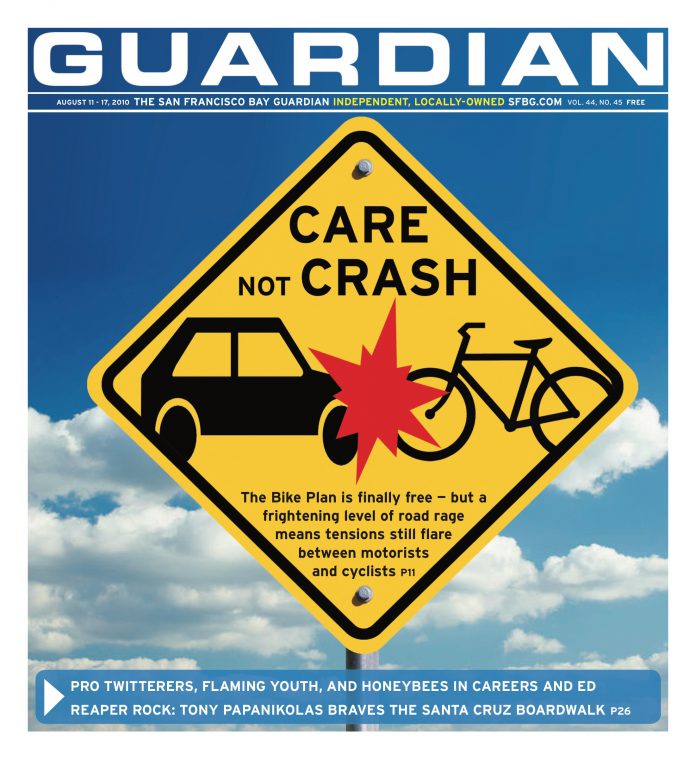caitlin@sfbg.com
CAREERS AND ED Social media consultant Hermione Way is showing me the tools of her trade, an impressive arsenal. There’s the laptop, of course, and and iPhone and iPad, both fetchingly clad in pink rubber casing. “I don’t really need that one,” she says of the last gewgaw. “But it does look rather cool when I pull it out to show people things in meetings.”
And there it comes, that smile. A darling blonde who regularly posts to three blogs — including two websites she started herself (www.newspepper.com and www.techfluff.tv) — she is ardently read by 8,000 Twitter followers, has maxed out her Facebook friend limit, and has a regular segment on a British news channel. Way, freshly relocated to the Bay from London, is teaching me how to social network, professionally.
Which is — do I need to say this, even? — a rapidly growing field and one that’s starting to become a lucrative option for Web-savvy job seekers. Most social network streams for celebrities, politicians, and products are currently helmed by an enthusiastic combination of eager interns and youth-conscious marketing firms. But using social marketing to brand yourself as you work your way up the corporate ladder is good way to get your foot in the door for interviews and build connections with other like-minded professionals.
Due to its DIY ethic and nascent stage, however, branding yourself through social networking is also something that has yet to be established in academia, apart from occasional seminars like those offered by UC Berkeley in association with marketing firms. Way attended university back home in journalism but “the word ‘blog’ wasn’t mentioned once in my entire program,” she says. She wanted to provide a way for students to learn about online reporting skills, so she put out the British equivalent of a Craigslist ad and started making low budget promo videos for companies and marketing them virally.
I think. It was kind of hard to grok what some of the social networking heads I interviewed were telling me — it’s all just so haphazard-seeming, which I guess is the point. “It’s all about being audacious and being strategic about it,” said Matt Van Horn, who runs business development and publisher relationships for social news aggregator Digg.com. (He helpfully explained his job to me as “helping others in optimizing traffic from Digg and the placement of their Digg buttons.” Thanks, bro.) Van Horn got his start pretty much stalking down his future Digg bosses after graduating college. “I liked the site and I knew I wanted to work there — it’s pretty easy to guess people’s e-mail addresses.”
Cake, right? So why do I stare at my woefully underused Twitter account wondering what the hell I’m doing with my life? Way and Van Horn were kind enough to counsel me. Here are their dos: Be human — building your personal brand is tantamount to the career of a social networker. Have an angle, be regular (Way posts on Twitter three to eight times a day: “You’ve always got to be in people’s minds”) and follow up with, well, pretty much everyone you meet.
This from Van Horn: “I friend everyone I have a meaningful conversation with.” Oh, and forget that whole boundary between online work and play, it’s so 2008. Van Horn tells me he resents people who expect him to keep professional contacts restricted to his account on professional contact site LinkedIn. “That line is completely blurred.”
Don’ts? No “pure promotion,” please. “There is a way to do this that is informative and intelligent rather than just trying to sell to people,” Way said, sipping from her caffeinated beverage. And no blind thrusts into the Internet abyss. Van Horn finds it nearly impossible to take mass e-mails seriously. Take the time to learn a little before you poke him and “we’ll go out for a beer and we’ll talk,” he says.
I will not be the only one to find some of these rules a bit daunting, if not disturbing. But if many of the online gurus are to be believed, social networking signals a seismic shift in our culture. Studies are showing that it not only affects our professional world, but also how we structure our free time — even our sense of self. There’s no doubt that in some fields the spoils go to those who can parse retweets and hash marks. Which, to those who can ride the wave, is thrilling. Way was able to break into big-league journalism on the basis of her drive. “As a student with no budget, I’ve leveraged Facebook and Twitter to do all my marketing for free. You don’t have to have a rich dad that works on CNN.”
So c’mon, get your Internet celebrity already! After our interview, I checked Hermione’s Facebook profile (she made room in her friends list for me, don’t be jealous). There it was, at 5:36 p.m.: “Just had an interview with the San Francisco Bay Guardian on how to become a social media expert.” Hot dang — I guess now I’m famous too.

